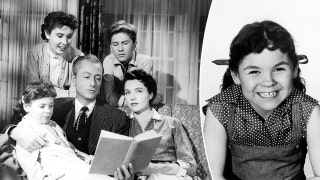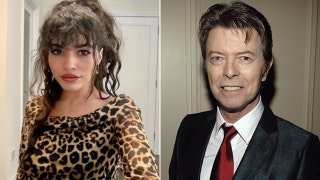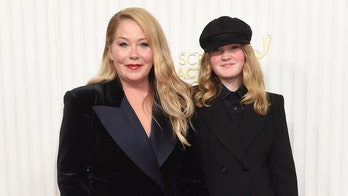
An image from the video for Dire Straits' "Money for Nothing."
Starting at 8pm Friday night, the Edmonton, Canada classic rock radio station K97 will play the recently banned Dire Straits hit, “Money for Nothing,” nonstop and unedited for an hour in protest of a Canadian regulator’s decision to ban the original version of the song, first released in 1985, because it contains the word "fa---t.."
“We’re not afraid of repercussions. We have never had a complaint in the 25 years we have played the song,” K97 Music Director Todd James told FOX411. “We will play it in its entirety and unedited as we have always done and if someone wants to file a complaint we will take it from there."
But K97 may be alone.
Most Canadian radio stations that play rock music have been bombarded with phone calls from listeners unhappy about the ban of the quarter-century old Dire Straits hit— still, despite the many complaints, the majority of stations don’t plan to break the rules and broadcast the forbidden tune like the Edmonton station.
“The audience reaction is ‘Are you kidding me?’ There is a lot of disbelief. This song was a major hit and we have played it a billion times on the radio and we never even thought it was an issue until the ruling came out,” David Farough, Vice President of Brands and Programming for Corus Entertainment, which owns and operates 52 radio stations from Toronto to Vancouver told FOX411.
“The CBSC does some very good things, but they don’t always make the best decisions,” Farough said.
Music directors and DJs from Corus stations manned the phones all day Thursday and directed angry listeners to call the CBSC and complain. But Farough said that his stations will not buck the ruling like K97 and play the banned version. Some of Corus’ classic rock stations are going in another direction and plan to stop playing the Dire Straits hit altogether instead of playing the edit.
“It has become a credibility issue,” Farough says. “Sometimes it is better not to play the song. We are leaving it up to the individual markets.”
“Money for Nothing”, written by Dire Straits frontman Mark Knopfler and famed rock star Sting, neither of whom returned queries from FOX411 by deadline, is a satire of the boom of MTV rock stars in the eighties. It is written from the perspective of a blue collar worker who, when jealous and ticked off, refers to the rockers as the offensive f-word.
An offended listener complained to the Canadian Broadcast Standards Council last year about the song’s inclusion of the homosexual slur, and on Wednesday the CBSC ruled that the use of the gay slur breaches the national broadcast authority’s code of ethics. The CBSC ruled that the song can be played on the radio in an edited form without the slur.
The CBSC ruling panel said that even though the song has been accepted for the past 25 years it does not mean that its lyrics are acceptable today.
The Gay and Lesbian Alliance Against Defamation which protects the rights of gay and lesbian individuals here in the United States told FOX411 they don’t make it a practice to comment on Canadian issues, but Helen Kennedy, executive director of the Canadian gay-rights group Egale championed the decision to Canada’s Globe and Mail.
“It’s the word that is used most often in hate crimes motivated by sexual orientation, which we know are the most violent, against gay men,” Kennedy said.
The unprecedented ban raises concerns about other golden oldies with lyrics that would be offensive to politically correct modern ears, like Bob Dylan’s use of the n-word in the song "Hurricane" or maybe even Bruce Springsteen’s “yellow man” in “Born in the USA.”
The sudden crackdown on “Money for Nothing” has freedom of speech advocates concerned that this week’s ruling represents a slippery slope for any song that could be interpreted as offensive in hindsight.
“It is concerning that the CBSC has focused on one word rather than what this song is about,” Cara Zwibel, director of the Fundamental Freedoms program at the Canadian Civil Liberties Association told Fox411. “I hope we won’t head down a slippery slope, because this opens so much up to question since there are many songs people could consider offensive. We think there needs to be a wide space for artistic expression.”













































